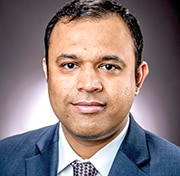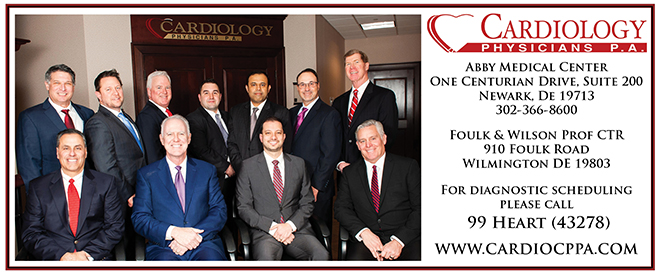The Mitral Valve Clip
 By Dr. Pranav Kansara
By Dr. Pranav Kansara
Mitral Regurgitation (MR) is a type of valvular heart disease where there is backward flow of the blood from the left ventricle which is the main pumping chamber of the heart into the left atrium. It is the most common form of valvular heart disease in the United States and the prevalence increases with age. Mitral valve is a complex anatomic structure that consists of anterior and posterior leaflets, mitral valve annulus and subvalvular apparatus made of papillary muscle and chordae tendineae. Anatomic or functional abnormalities of any of these structures or left ventricles can cause mitral regurgitation. Mitral regurgitation can be broadly categorized as primary (degenerative), or secondary (functional). This classification helps differentiate primary lesions of the mitral leaflets and subvalvular apparatus such as mitral valve prolapse and flail from secondary dysfunction due to annular or left ventricular dilation and left ventricular dysfunction related to cardiomyopathy or prior myocardial infarction causing leaflet mobility restriction and impaired coaptation. Severe mitral regurgitation can cause shortness of breath, leg swelling, reduced exercise capacity and congestive heart failure.
Management of significant mitral regurgitation mainly depends on its mechanism along with the patient’s age and comorbid conditions. For primary MR, mitral valve surgery is considered the best therapeutic option for patients who are good candidates. Surgical options for secondary MR have been very limited with clinical outcome data not supporting its use for standard patient management. Medical therapy has been the only alternative until recently. Transcatheter edge-to-edge repair technique (TEER) of the mitral valve has been developed and FDA approved. Many patients with primary severe MR are elderly, frail individuals with multiple comorbidities and not good candidates for cardiac surgery. TEER is offering a unique management option to improve quality of life for such patients. In 2019, FDA approved use of MitraClip (Abbott Laboratories) device for select symptomatic patients with severe secondary MR on maximally tolerated guideline directed medical therapy for congestive heart failure based on the COAPT (Cardiovascular Outcomes Assessment of the MitraClip Percutaneous Therapy for heart failure patients with Functional Mitral Regurgitation) clinical trial. The COAPT trial has demonstrated significant benefits of TEER compared to medical therapy with respect to improvement in quality of life, longevity and reduction in heart failure related hospitalizations for patients with reduced left ventricular systolic function who continue to have significant MR on optimal medical therapy. In 2022, PASCAL (Edwards Lifesciences, Irvine, California) TEER device was approved by FDA for primary severe MR in patients with prohibitive cardiac surgery risk.
The TEER therapy focuses on improving anterior and posterior mitral valve leaflet approximation and coaptation by implanting a device aimed at reducing MR. The device is delivered via a large catheter from a patient’s femoral vein. The procedure is done under anesthesia and the device is implanted on the mitral valve under imaging guidance. The procedure is minimally invasive with a short stay in the hospital and rapid recovery at home. Patients can walk in just a few hours after the procedure. At Cardiology Physicians, we offer comprehensive evaluation of patients with mitral valve regurgitation. Dr. Kansara performs TEER for appropriately selected patients to improve their cardiovascular outcome and quality of life. Patient evaluation can be arranged by calling 302-366-8600.
Bio
Dr. Pranav Kansara joined Cardiology Physicians PA in 2023 and has been a practicing cardiologist since 2017. Dr. Kansara grew up in the western part of India in Vadodara, Gujarat where he completed his medical school education and relocated to the United States for postgraduate training. He completed Internal Medicine residency from SUNY Buffalo followed by fellowships in Cardiology and Interventional Cardiology from Christiana Care Health System in Newark, DE. He completed further training in structural and valvular heart disease from Cedars Sinai Medical Center in Los Angeles, CA.
Dr. Kansara is board certified in Internal Medicine, Cardiovascular medicine and Interventional cardiology by American Board of Internal Medicine and has been recognized as board certified in Adult Echocardiography by American Society of Echocardiography. His professional associations include Fellowships in American College of Cardiology, Society for Cardiovascular Angiography and Interventions and membership in European Society of Cardiology.
Dr. Kansara’s career focus includes percutaneous coronary interventions, transcatheter interventions for patients with valvular heart disease, left atrial appendage occlusion therapy, percutaneous closure of intracardiac defects, alcohol septal ablation for patients with hypertrophic cardiomyopathy and transcatheter therapies for patients with advanced heart failure.
Dr. Kansara has published numerous articles in multiple leading peer reviewed journals. He remains very active in clinical research and presents at national and international conferences. He has been active in multiple clinical trials as principal investigator. He is an active member of the structural heart disease councils and work groups at multiple national cardiovascular societies.
Dr. Kansara resides in Newtown Square, PA with his wife Krishna and son Keshav.
Cardiogoly Physicians P.A.
Abby Medical Center 302-366-8600 One Centurian Drive, Suite 200 Newark, DE 19713
Foulk & Wilson Professional Center 910 Foulk Road Wilmington DE 19803
For diagnostic scheduling please call 99 Heart (43278)
Follow @cardiocppa on facebook


